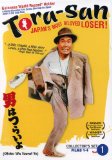| Reviews & Columns |
|
Reviews DVD TV on DVD Blu-ray 4K UHD International DVDs In Theaters Reviews by Studio Video Games Features Collector Series DVDs Easter Egg Database Interviews DVD Talk Radio Feature Articles Columns Anime Talk DVD Savant Horror DVDs The M.O.D. Squad Art House HD Talk Silent DVD
|
DVD Talk Forum |
|
|
| Resources |
|
DVD Price Search Customer Service #'s RCE Info Links |
|
Columns
|
|
|
Tora-San: Collector's Set 1
THE MOVIES:
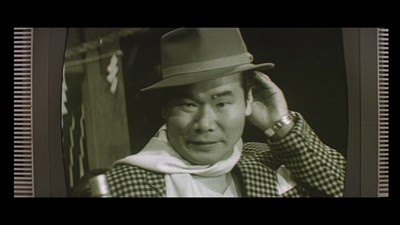
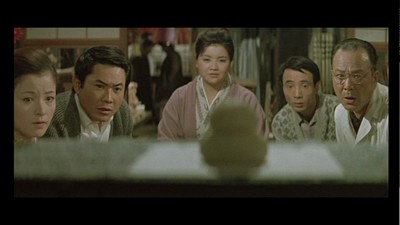
I wasn't sure what to expect when I signed on to review Tora-San: Collector's Set 1. I had read Stuart Galbraith IV's extensive reviews of the Japanese DVDs of this movie series over the years with some fascination. Forty-eight movies released nearly two a year from 1969 to 1996, starring the same actor in the lead and almost all directed by the same filmmaker--what a daunting and intriguing item. That's a lot of time to invest in one thing, but I've watched at least as many hours of various television series, invested that much time into a bunch of comic book serials--why not a movie? But where to start? And how? And would I even get the humor of a set of films devoted to the life of the common man in Japan? Cultural humor is not always easily accessible. I know a lot of recent manga imports have tried to preserve most of the pop-culture humor, and most of the time it leaves me scratching my head. And those books are contemporary.
AnimEigo's Tora-San: Collector's Set 1 is the first major release of the Tora-san movies in North America. This boxed set debuts with the first four movies in the franchise, released in 1969 and 1970. The collection, I should note up front, is put together with the aid of Galbraith, a noted author and scholar of Japanese cinema, as well as a contributor to our site. Part of his job is to help provide the background and ease us into the world of Tora-san, through his commentary, the accompanying booklet, and more immediately, a second set of optional subtitles to run concurrently with the dialogue, translating street signs and explaining obscure references and wordplay. I was surprised when these popped up. I may be wrong, but I can't remember ever seeing such a thing before, and the first sight of them made me panic a little--particularly because they were hard to keep up with. I had barely digested the dialogue before I could jump up to the explicator and the lower subs moved on. Maybe this was too much for me!
Well, I should have never feared. I was less than half an hour into the lead film, 1969's Tora-San, Our Lovable Tramp (Otoko wa tsurai yo), before I was completely smitten with this quaint yet effective comedy. There is something undeniably endearing about the hapless blowhard Tora-san and the universality of his familiar (and repetitive) predicaments that are identifiable beyond all culture lines. This drifter with a mouth matched only in size by his heart is played by actor Kiyoshi Atsumi, a man with the face of a bulldog and a demeanor to match. They seem gruff and fearsome, but they're really kind of sweet once you get past all the snarling and the slobber. As Tora-san tells us in voiceover, he is a drifter, having left his family some time before. His mother was always absent, his father has died, and he has left his last immediate relation, his sweet half-sister Sakura (played faithfully episode to episode by Chieko Baisho), with an aunt and uncle in Shibamata, a suburb of Tokyo. He is returning to visit them for the first time in many years, having wandered Japan as a "salesman." Read that as con man, a pitch man if we are being kind. He calls himself "yakuza," but Tora-san is too harmless to be a gangster. His crimes are not ones of ill intent; rather, he's paving the road he travels with misplaced good.
There's a pleasing formula to the Tora-San movies. In each installment, the film basically begins with some kind of predicament that doesn't go Tora's way, often centering around the return to his family in Shibamata (in this way, being a little like the movies themselves, visiting the audience periodically). If Tora-san doesn't return home at the start, such as in the fourth film Tora-san's Grand Scheme (Shin otoko wa tsurai yo), the middle act ends up being the reunion. The second act generally has Tora-san reacting to the fallout of his latest misstep, and usually meeting his love interest for this particular movie. The final act is when he finds out that this love interest is already betrothed to another, and in a lot of cases, he helps her secure her situation before he heads out on the road again, disappearing into the sunset via whatever mode of travel will carry him.
So, the plot of Our Lovable Tramp sees Tora-San come home for the first time in a long time, reuniting with his sister and helping her get married, as well as falling in love with the beautiful Fuyuko (Sachiko Mitsumoto). When it is revealed that Fuyuko is already engaged, the shamed and heartbroken gambler departs. The film closes in voiceover with Tora's letter to Fuyuko, asking her to watch over Sakura and her newborn child. Film #2, Tora-san's Cherished Mother (Zoku otoko wa tsurai yo), hinges on Tora's discovery that his real mother, a geisha who had only a brief affair with his father, is still alive and not dead as previously thought. His chance encounter with an old teacher leads him to rediscover a sort-of childhood sweetheart (Ori'e Sato), the new object of affection for the hobo. She helps him find his mother (and find this fruit didn't fall far from the tree), but Tora-san is unaware that she has fallen in love with the handsome doctor who took care of him following a particularly enthusiastic overindulgence. These two are directed by Yoji Yamada, famous recently for his films The Twilight Samurai and The Hidden Blade, and he was the man who would ride with Kiyoshi Atsumi all the way to the end.
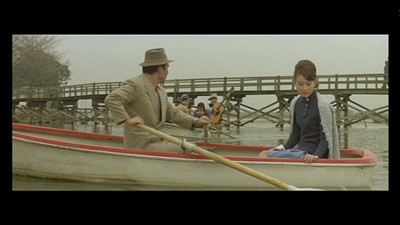
The third film is Tora-San, His Tender Love (Otoko wa tsurai yo: futen no Tora), the first to be directed by someone besides Yoji Yamada. Azuma Morisaki helms this entry, which bends the formula a little. After his family makes a bad marital arrangement for Tora-san, he departs to the country and ends up working in an inn for a beautiful widow named Oshizu (Michiyo Aratama). Unfortunately, just like always, Tora-san is the only one that doesn't know she is already in a secret romance. This one ends unpredictably, with Tora-san appearing on TV on New Year's Eve and professing his love while his aunt, uncle, and Sakura watch.
Tora-San's Grand Scheme is directed by Shun-ichi Kobayashi, and it begins with Tora-san trying to finally pay his family back for all the trouble he's caused and money he's spent. A big day at the horse races yields a lot of cash, and Tora promises his Auntie (Chieko Misaki) and Uncle (Shin Morikawa) a trip to Hawaii. Only, one of the con man's protégés who has gone legit has ended up working for another con man, and the travel agent disappears with Tora-san's winnings. Humiliated, Tora-san tries to convince the family to hide out in their sweets shop, only for a burglar (Ichiro Zaitsu) to interrupt their scam. Tora-san disappears, and when he comes back, his Uncle has rented his room to Haruko (Komaki Kurihara), a pretty kindergarten teacher. Tora-san helps her get over the death of her estranged father, but there's no one left to ease Tora-san's broken heart.
Each film in the series gains in confidence, particularly in terms of slapstick. There is very little in Our Lovable Tramp, but there are a lot of hilarious pratfalls in the others. Bonked heads, spilled drinks, etc., all show off what a gifted comedian Kiyoshi Atsumi is. The physical comedy also provides a release for the audience, the clownishness distracting from some of the heavy heartbreak that drives the plot. Tora-san is the guy that will never win, and he's the only one that seems to not know it. His few moments of self-awareness usually come when he accidentally overhears his friends and family talking about what an idiot he is--though their conversations are never mean-spirited. In fact, a weariness creeps into these chats, showing they truly care for Tora-san and wish things could be different. Again, they are the voice of the audience. We feel the same way, and we'd never want to tell the poor guy. The fact that he carries on anyway is a large part of why we love him. Tora-san never gives in, he'll always keep trying.
Historically, Tora-san is a symbol the Japanese populace could relate to as they emerged from the post-War period and into a more prosperous era. There is something akin to the American Dream in Japanese life as shown in the Tora-san films. He is the guy who is always trying to get ahead, to find a new life despite whatever obstacles come along. One of the commentators in the liner notes compares the can-do spirit of the Tora-san franchise to the films of Frank Capra, and the family dynamic also allows for obvious connections to be drawn to Yasujiro Ozu. I actually thought of the movies of Hiroshi Shimizu I watched earlier this year when I reviewed the Eclipse boxed set of some of his films. Shimizu had a similar interest in the differing locales of Japan and the difference between country life and city life, as well as an affection for the common man. The humor in the Tora-san movies comes from a folksy tradition, like the kind of small-town tales that get told over and over, and exaggerated each time, on bar stools and outside general stores. Tora-san is his own mythologizer in this way. Grand Scheme ends with him on a train telling the passengers about what happened to him, though with his own particular spin. Each of the four movies in Tora-San: Collector's Set 1 have a similar scene, with Tora-san telling whoever will listen about his various exploits.
In fact, predictability is one of the comforts of a common life. The familiarity of a Tora-san plot is part of the charm. The drudgery of our own day-to-day routine is somewhat validated by the fact that such a scamp is also the victim of routine. Unpredictability only brings our hero trouble, and if the status quo was never restored, then he could not come wandering back to entertain us once again. Tora-San: Collector's Set 1 was a real treat, each film more enjoyable than the last, and I look forward to a Set 2.

THE DVD
Video/Packaging:
The four movies in the Tora-San: Collector's Set 1 box get treated with the greatest of respect, porting these old films to discs in gorgeous 2.35:1 anamorphic transfers. The colors are vivid and rich, maintaining the pastelly look of late-1960s film stock, but without adding any extra grain, and free of scratches or dirt. These films are lovely to look at, the DVD prints are spectacular.

Sound:
The original Japanese soundtracks are mixed in basic stereo and sound very good, no hiss or crackles or any problems. The English subtitles are given the greatest of care, and we are given a variety of options. The main subtitles can be chosen in either yellow or white, and they can be viewed in three ways: as the full dialogue with upper titles that translate signs and provide cultural notes in the opposite color, as just the dialogue without notes, or just the dialogue presented as a more concise straight translation. The dialogue titles don't stay in the main color, but change to indicate different speakers and allow for viewers to keep up with the pace of the conversation without getting confused.
A fourth subtitle option is to see the cultural notes without the dialogue.

Extras:
Tora-San: Collector's Set 1 is a four-disc set. Each individual movie comes in a plastic slimline case, and they all fit in a sturdy side-loading box. A 26-page booklet contains photos and essays by definitive Tora-san director Yoji Yamada and critics and scholars Stuart Galbraith IV, Kevin Thomas, Alexander Jacoby, Michael Jeck, and Donald Ritchie.
Galbraith also provides commentary for the lead movie, Tora-san, Our Lovable Tramp. Coupling this commentary track with the other text-based extras and the notes in the subtitles give a full cultural portrait that will help viewers appreciate the full story. Galbraith also talks about the history of the film series, and he adds his own personal touch, sharing his own experiences as they relate to the Japanese social constructs shown in the film. It's a great track, truly enhancing one's viewing of Our Lovable Tramp and establishes the foundation for properly enjoying the other discs.
All four movies also have the original trailers for the films, as well as text-based features. Those are program notes, cast and crew bios, image galleries, and an interactive map of Tora-san's travels.
FINAL THOUGHTS:
Highly Recommended. One of the most respected series in Japan, Tora-San finally comes to America via this introductory boxed set. The first four of the serialized movies are gathered in the Tora-San: Collector's Set 1, bringing us into the world of the scheming and romantic drifter played by Kiyoshi Atsumi. Full of slapstick and melodramatic plots that chronicle the hobo's cons and his heartbreaks, these movies may be formulaic, but they are increasingly self-assured and like a good candy, totally addicting and more enticing the more you consume. It's easy to see why Tora-San has broken records as the longest running film series. It's impossible to resist. Tora-San: Collector's Set 1 is a fantastic package, shining a spotlight on movies that we've been missing out on here in North America. Go get it!
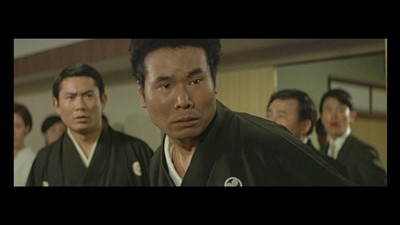
Jamie S. Rich is a novelist and comic book writer. He is best known for his collaborations with Joelle Jones, including the hardboiled crime comic book You Have Killed Me, the challenging romance 12 Reasons Why I Love Her, and the 2007 prose novel Have You Seen the Horizon Lately?, for which Jones did the cover. All three were published by Oni Press. His most recent projects include the futuristic romance A Boy and a Girl with Natalie Nourigat; Archer Coe and the Thousand Natural Shocks, a loopy crime tale drawn by Dan Christensen; and the horror miniseries Madame Frankenstein, a collaboration with Megan Levens. Follow Rich's blog at Confessions123.com.
|
| Popular Reviews |
| Sponsored Links |
|
|
| Sponsored Links |
|
|
| Release List | Reviews | Shop | Newsletter | Forum | DVD Giveaways | Blu-Ray | Advertise |
|
Copyright 2024 DVDTalk.com All Rights Reserved. Legal Info, Privacy Policy, Terms of Use,
Manage Preferences,
Your Privacy Choices | |||||||









